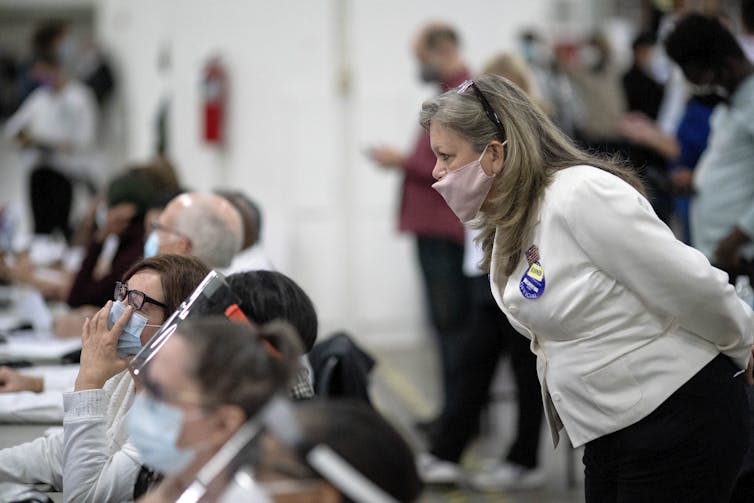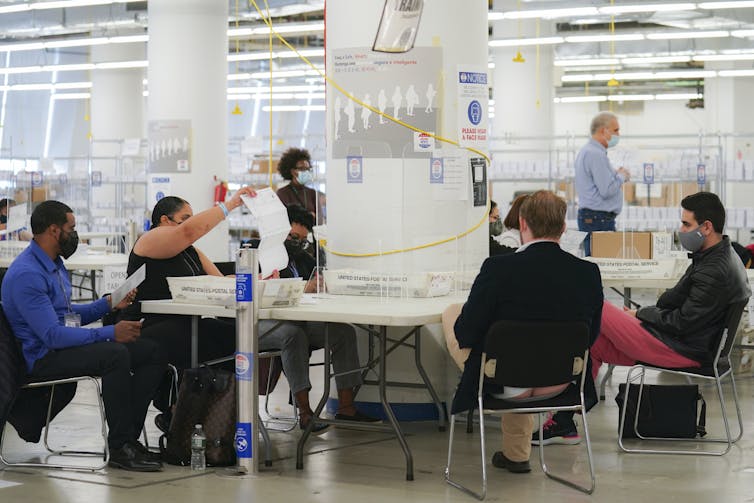Poll watchers keep an eye on voting in Georgia in November 2022. AP Photo/Ben Gray
by Mollie J. Cohen, Purdue University and Geoffrey D. Sheagley, University of Georgia
When most people think of their experience of voting in person, they may remember other voters at the polls, or the hardworking election officials checking people in and helping people submit their ballots. But in many elections, a third group is often present: poll watchers.
Poll watchers are ordinary citizens who volunteer to observe elections on behalf of an organization. Many of them do so on behalf of a specific political party. Other volunteers are nonpartisan poll watchers; they observe the action at polling places on behalf of nonpartisan organizations, including domestic groups and international election watchdogs such as the Carter Center or the Organization for Security and Co-operation in Europe.
The United States has not historically relied extensively on international election monitors, and they are prohibited in some states, such as Tennessee. Most often, when journalists and academics like us refer to poll watchers in the U.S., we mean partisan election observers.
If all goes well on Election Day, poll watchers’ jobs will be tedious. They will simply watch voters performing the key acts of democracy: filing into the precinct, engaging with poll workers and casting ballots. Partisan poll watchers will also likely observe the tabulation of ballots and receive an official copy of the results in case they choose to conduct a simultaneous tally.
What do poll watchers do?
Poll watchers protect their organization’s interests at polling places. By observing as ballots are cast and counted, poll watchers can help ensure that only eligible voters participate and that blatant election rigging – like stuffing the ballot box with unauthorized ballots – does not occur.
As observers independent of the government officials they are monitoring, poll watchers can add an extra layer of transparency and accountability to election proceedings and help to ensure that elections are free and fair.

AP Photo/David Goldman
However, poll watchers can also undermine the integrity of elections. For example, poll watchers may overzealously – and illegally – challenge a citizen’s eligibility to cast a ballot without cause. Or their presence may intimidate or pressure voters.
In the 1980s, for example, the Republican Party in New Jersey recruited uniformed, off-duty police officers to watch the polls and posted signs offering a reward for information about people violating election laws. A lawsuit over that activity led to a nationwide court order barring the Republican National Committee from using poll watchers without clearance from a federal judge. The order was lifted in 2018.
Historical records show that, since the early 1800s, poll watchers from both parties frequently challenged the eligibility of African Americans and likely immigrants, often leading to their removal from the voter rolls. In cases like these, poll watchers can undermine the core democratic principle of voters’ freedom to participate.
It is also important to remember that many poll watchers are partisans – they work on behalf of their political parties. In fact, in recent years a central goal of the Republican Party has been recruiting and deploying poll watchers. Our research shows that in the current era of polarized partisan politics in the United States, the mere presence of partisan actors at polling locations can undermine voters’ trust in elections.
What are the rules?
While the history and partisan nature of election observation may raise concerns about voter intimidation, a variety of federal and state laws protect voters on Election Day.
Poll watchers are subject to federal laws that protect voters from intimidation and interference. Many states also have additional regulations that govern what poll watchers can do when observing elections.
For instance, some states require formal training. The state of Georgia, for example, requires all partisan poll watchers to complete training provided by their political party. Watchers in Ohio, on the other hand, must be registered voters but are not required to complete formal training.
Another important difference between states is whether they allow poll watchers to directly interact with voters. In some states, such as Georgia, poll watchers may not speak to voters. In others, such as Ohio, poll watchers can speak with voters but can’t threaten voters for choosing a certain candidate or encourage them to vote for another.

Challenging voters’ eligibility
A final important difference between states rules about poll watchers is whether they can challenge the eligibility of a voter. Good-faith challenges can arise when a poll watcher has a strong reason to believe that a voter is not eligible to vote in the district where they are voting. Pennsylvania poll watchers, for example, are allowed to keep a list of eligible voters and could register a challenge if they believe someone not on that list is attempting to vote.
Poll watchers who operate in bad faith may make challenges based on little or no evidence, with the intention of distracting poll workers, demoralizing voters and slowing voting, rather than ensuring the rules are followed correctly.
Poll watchers generally raise challenges at the polling place directly with election administrators, who are local volunteers and employees. Voters whose eligibility is challenged may have to cast a provisional ballot and present additional proof of their identification and residence to election officials, either on Election Day or in a later legal proceeding. Importantly, many states have strong regulations that aim to protect voters against arbitrary challenges to their eligibility. Challengers in Florida, for example, must submit a formal written oath attesting to the accuracy of their challenge and are subject to prosecution if the challenge is determined to be “frivolous.”
If a poll watcher suspects that something is amiss at a polling location while voters are casting ballots or while ballots are being tabulated, they can raise concerns with local election administrators or other election officials, such as local boards of elections. They may also pass the word up through the political party they are representing.
Many issues are straightforward to address, and election workers respond immediately. More complex concerns – or allegations reported to party leaders by many poll watchers in different locations – may ultimately lead to legal action in the courts.
Mollie J. Cohen, Assistant Professor of Political Science, Purdue University and Geoffrey D. Sheagley, Associate Professor of Political Science, University of Georgia
This article is republished from The Conversation under a Creative Commons license. Read the original article.




